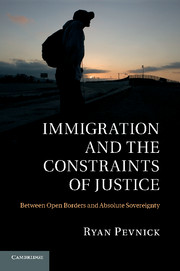Book contents
- Frontmatter
- Contents
- List of illustrations
- Acknowledgments
- 1 Introduction
- 2 Statism, self-determination, and associative ownership
- 3 Refining associative ownership
- 4 Rights-based arguments for open borders
- 5 Distributive justice and open borders
- 6 The significance of national identity
- 7 Applications
- Bibliography
- Index
4 - Rights-based arguments for open borders
Published online by Cambridge University Press: 24 February 2011
- Frontmatter
- Contents
- List of illustrations
- Acknowledgments
- 1 Introduction
- 2 Statism, self-determination, and associative ownership
- 3 Refining associative ownership
- 4 Rights-based arguments for open borders
- 5 Distributive justice and open borders
- 6 The significance of national identity
- 7 Applications
- Bibliography
- Index
Summary
It is perhaps difficult to imagine, but during the United States' early years a policy of nearly open borders prevailed. Immigrants were an important source of labor for a fast-expanding country busy developing and pushing into frontier territory. In the 1860s:
Some US consuls hired full-time agents to attract prospective settlers with free land. The federal government was far from alone in this venture. While Western states and territories continued to use immigration agents and publicity campaigns to induce immigration from Europe, railroad companies sent agents to Germany to recruit farmers to develop vast railroad lands.
(Tichenor 2002, 66)The few immigration-related laws passed prior to the Civil War did little to restrict the flow of immigrants, pertaining instead to naturalization and record-keeping. Although almost a century has passed since the United States first developed a comprehensive immigration policy (as opposed to laws meant only to exclude particular racial or national groups), the idea of the United States as opening a golden door for the world's tired and poor retains a foothold in political and popular discourse.
Moreover, in arguments regarding the ethics of immigration policy, many analysts advocate open borders (Ackerman 1980; Carens 1987; Carens 1992; Cole 2000; Dummett 2001; Lomasky 2001; Pritchett 2006; Wall Street Journal 1984). For example, Michael Dummett argues that:
All states ought to recognize the normal principle to be that of open borders, allowing all freely to enter and, if they will, to settle in any country that they wish.
(Dummett 2001, 80)- Type
- Chapter
- Information
- Immigration and the Constraints of JusticeBetween Open Borders and Absolute Sovereignty, pp. 78 - 103Publisher: Cambridge University PressPrint publication year: 2011

